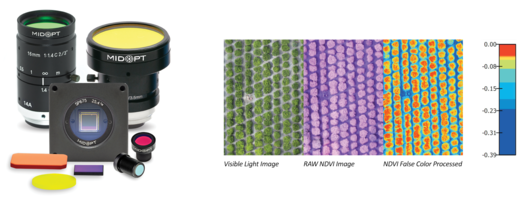Optical Filters are suitable in aerial vegetative monitoring.
Press Release Summary:

Available in standard threaded mount to fit any camera size, Optical Filters are available in 0.5mm, 1.1mm and 2.0mm thicknesses. Modifying single color camera by removing IR blocking filter, Bi725 Red Edge Bandpass Filter allows reflected near-infrared light (850nm) and green light (550nm) to capture camera sensor’s in red channel and green channel. TB550/660/850 and TB475/550/850 filters when mounted in converted consumer cameras are helpful in calculating ENDVI.
Original Press Release:
New Optical Filters for NDVI Related Applications from MidOpt
MidOpt announces the availability of new imaging filters for plant health surveillance applications. Four new filter types include:
Bi725 Red Edge Bandpass Filter is a 25nm FWHM filter designed for use in aerial vegetative monitoring. This so-called "Red Edge" filter isolates the wavelength region where the most rapid change in reflectance occurs in foliage. When plants are stressed or dying, photosynthesis slows down or stops. IR wavelengths are absorbed, while more visible light-particularly red light-is reflected. The transitional 725nm band is uniquely affected by vegetative health changes and provides information relating to chlorophyll and nitrogen status used to distinguish thriving from stressed vegetation.
The DB550/850 compliments the already available DB660/850 and DB475/850 filters. When modifying a single color camera by removing its IR blocking filter, incorporation of this filter in its place allows reflected near-infrared light (850nm) to be captured in the camera sensor's red channel and reflected green light (550nm) to be captured in the sensor's green channel (the blue channel is not used). Healthy vegetation will absorb (not reflect) green light and strongly reflect near-infrared light. Thus this information can then be used to apply a false color gradient to images to better highlight the contrast between regions of healthy vegetation vs. areas with stressed, diseased or no vegetation
Also available by the end of February, 2017 will be two new Triple Bandpass filters, TB475/550/850 Blue+Green+NIR and TB550/660/850 Green+Red+NIR. When mounted in converted consumer cameras used in aerial surveying applications, they can help provide a more affordable, lightweight alternative vs. systems employing three or more cameras or sensors. Blue-Green-Near IR wavelength information is used to calculate and map Extended Normalized Difference Vegetation Index (ENDVI) data, which is similar to but spectrally different vs. traditional NDVI data. Soil background, differing atmospheric conditions and various types of vegetation can all influence the reflection of visible light somewhat differently. ENDVI analysis at times may be able to impart more accurate or reliable information regarding plant or crop health by additional leveraging of information in the blue portion of the spectrum. The formula used is:
ENDVI = [(NIR + Green) - (2 * Blue)] / [(NIR + Green) + (2 * Blue)]
Green-Red-Near IR data is used for applications where Chlorophyll Vegetation Index (CVI), Normalized Green (NG) and other vegetative index monitoring may be preferred. TB550/660/850 filters, when mounted in converted consumer cameras, can again help to achieve a more affordable, lightweight alternative to systems using three or more cameras or sensors. Applicable formulas include:
CVI = (NIR * Red) / (Green ^ 2)
NG = Green / (NIR + Red + Green)
All of the above filters are offered in various standard threaded mounts and custom cut to fit any lens or camera size or opening. Standard material thicknesses include 0.5mm, 1.1mm and 2.0mm.
Learn more at www.midopt.com/filters-for-ndvi
About Midwest Optical Systems
Midwest Optical Systems (MidOpt) is a global leader providing stock and custom machine vision filters, lenses, lighting and other precision optical solutions. Represented in over 30 countries and offering over 3,000 standard off-the-shelf products, over 100,000 filters and 50,000 lenses are shipped every year. MidOpt filters are recognized as the industry standard for automated imaging applications to ensure reliable control, repeatable results and superior image quality. All filters are produced to demanding standards regarding durability and spectral, optical and cosmetic characteristics. Unlike traditional filters, MidOpt filters closely emulate the output of all common LED/lighting types and colors. Designs are available to provide optimal performance regardless the application wavelength, ambient lighting, or lens focal length.
Midwest Optical Systems
322 Woodwork Lane
Palatine, IL 60067
United States
Tel: 847-359-3550
Email: marketing@midopt.com




